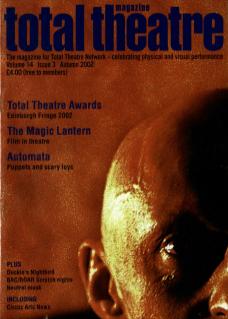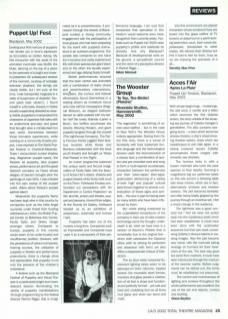Evoking your first memory of puppetry can situate you in time's slipstream as accurately as carbon dating. My first encounter with the world of the animated inanimate was Muffin the Mule, dancing on the top of a piano to the serenade of a bright and cheerful presenter. On subsequent reviews of this moment, courtesy of nostalgic television playback, the strings are clearly visible, but I am sure, at the time, I was transported magically to a state of suspension of disbelief. Several years later (ahem!), I found myself in a Bunraku theatre in Osaka equally suspending disbelief as clearly visible puppeteers manipulated the characters of Japanese folk tales with an anatomical accuracy and grace that brought alive a miniaturised but epic world. Somewhere between these formative experiences, while working on a community theatre project, I was exposed to The World Puppet Festival in Charleville-Mézières. There I encountered surreal shadow play, Wagnerian puppet opera, the Passion as puppetry, blue puppet shows, performance art and the great Spanish company La Claca whose allegory of fascism brought alive the paintings of Joan Miró. I was initiated into the epic sweep of the puppet world. (More about Sweep's puppet partner later!)
Meanwhile the puppetry flame has been kept alive in this country by companies such as the Little Angel (currently under threat from funding withdrawal as I write), the British Puppet Centre at Battersea Arts Centre, Faulty Optic and Green Ginger amongst others. Compared to Europe, puppetry in this country would seem to be under funded and insufficiently profiled. However, with the persistence of various companies, training courses, the utilisation of puppetry in theatre and performance productions, there is change afoot and appreciation that puppetry is not only the preserve of the children's entertainer.
A festival such as the Blackpool Festival of Puppetry and Visual Theatre is a particularly bright and incandescent beacon illuminating the variety of puppetry manifestations (through programming by the festival director Rachel Riggs) that is as imaginative as it is comprehensive. A procession through the streets of Blackpool evoked a strong community engagement with the participation of local groups who had been preparing for the event with puppetry animateurs in an outreach programme. The parade also contained on one hand the innovative and vastly experienced IOU with their spectacular giant leech and on the other, the equally experienced and age-defying Sooty himself.
Street performances ensured that the town centre was animated with a combination of static shows and perambulatory interventions. Shoppers, the curious and festival aficionados found themselves in a waking dream as miniature circus acts rose behind newspapers (Original Mixture), an elegant ballroom dancer on stilts waltzed with his better half the lovely Yolanda (Larkin a Bout), two boffins scrutinised the streets (Moving People), and giant puppets tangoed through the crowds (The Lighthouse Company). The Fairly Famous Family juggled their lavatory brushes while Horse and Bamboo collaborated with the local youth theatre and brought us Ships that Passed in the Night.
An indoor programme balanced the unique, weird and fecund imagination of Faulty Optic with the beauty of Accès l'Air's object, shadow and puppet theatre while Sooty held court on the Prom. Forkbeard Fantasy confounded our perceptions with An Experiment in Contra Projection as film and life, screen and theatre, puppet and persona, blurred their edges. At the Grundy Art Gallery, Forkbeard treated us to an exhibition of peepshows, automata and trompe l'oeil.
Puppetry has been out of the nursery a long time. Companies such as Improbable and Complicite have used it as a component of their performance language. I am sure that companies that specialise in this medium would welcome even more recognition than currently exists. Festivals such as Puppet Up! 2002 raise puppetry's profile and celebrate its diversity. And why Blackpool? Because of developmental work on the ground, a sympathetic council and the vision of a perceptive director in Rachel Riggs...

